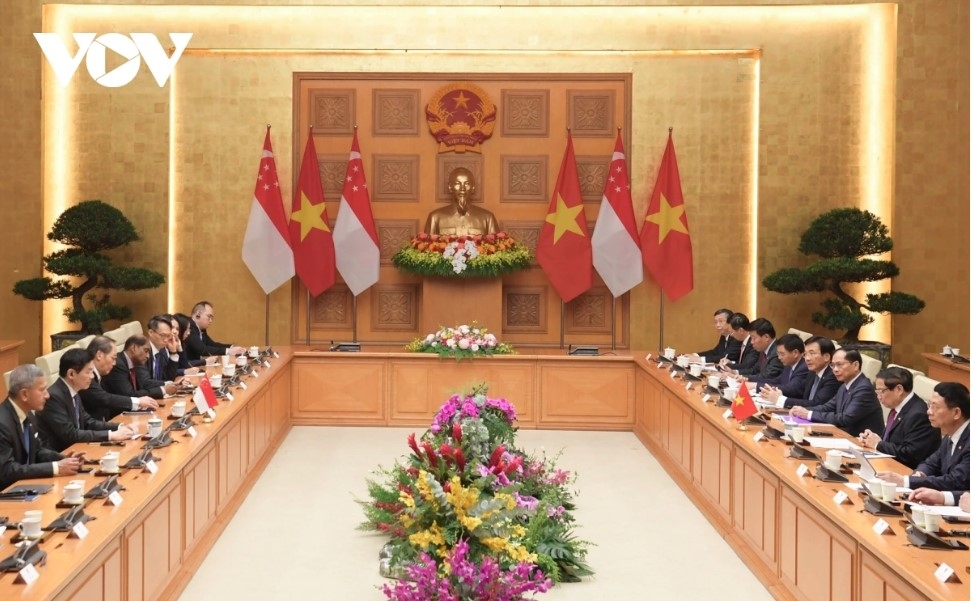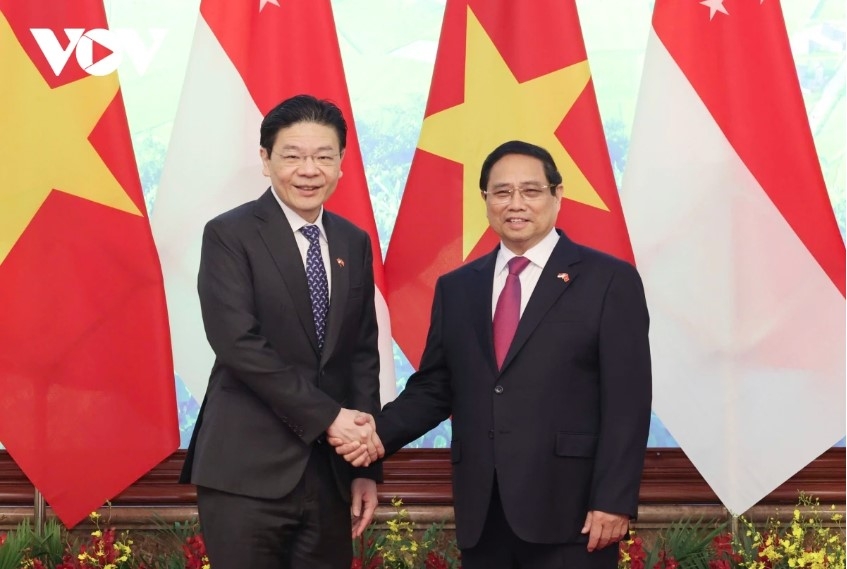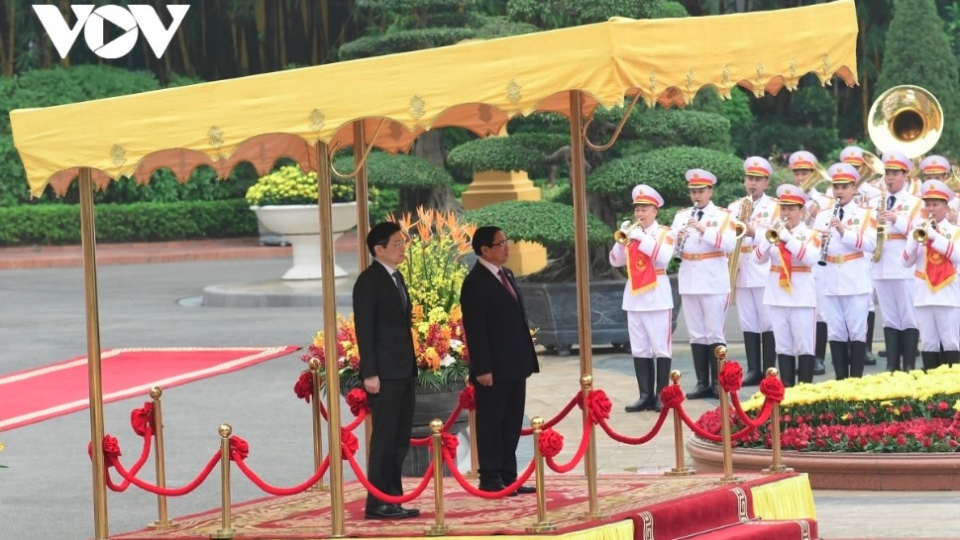Vietnam, Singapore vow to create new breakthroughs in Comprehensive Strategic Partnership
VOV.VN - Prime Minister Pham Minh Chinh and his Singaporean counterpart Lawrence Wong have agreed on "decisive and timely" measures to strengthen political trust and create new breakthroughs in their Comprehensive Strategic Partnership.

Talks were held between Prime Minister Pham Minh Chinh and his Singaporean counterpart Lawrence Wong on March 26 in Hanoi immediately after the official welcome ceremony for the latter.
During the talks, the Vietnamese Government leader said that Prime Minister Lawrence Wong’s official visit to Vietnam holds great significance as it marks the first high-level delegation exchange since the two countries upgraded their ties to a Comprehensive Strategic Partnership during the official visit of General Secretary To Lam to Singapore. It also serves as a key milestone in 2025, when Vietnam celebrates its 80th National Day and Singapore its 60th, sending a strong message of both nations' commitment to concretizing their new cooperation framework.
PM Chinh congratulated Singapore on its development achievements and wished the country success in organizing its 2025 General Election. He expressed confidence that Singapore will successfully carry out its initiatives, while promoting a fair, harmonious, and increasingly prosperous society.
He also shared that Vietnam is in the process of accelerating, making breakthroughs, and reaching its goals, striving for double-digit growth from 2026 onward and aiming for a new era of national prosperity, wealth, and development.
In response, PM Lawrence Wong expressed his pleasure at making his first official visit to Vietnam as Prime Minister, right after Party General Secretary To Lam's visit to Singapore, to speed up the implementation of concrete cooperation outcomes between the two countries.
The Singaporean leader congratulated Vietnam on its remarkable achievements over 40 years of perusing the renewal (Doi Moi) process, making it one of ASEAN’s leading economies. He affirmed that Vietnam remains one of Singapore’s most important partners in the region.
He also highlighted the historic significance of upgrading bilateral ties to a Comprehensive Strategic Partnership, noting that Vietnam is Singapore’s first such partner within ASEAN. This demonstrates the deep trust, close bonds, and shared aspirations of both nations’ leaders and people to further enhance their relationship.
Both leaders expressed satisfaction with the strong progress in bilateral relations. Singapore remains the second-largest foreign investor in Vietnam, with two more Vietnam-Singapore Industrial Parks (VSIP) recently approved, thereby expanding the network to 20 VSIPs across 14 provinces.
Bilateral trade has grown steadily, reaching US$10.3 billion in 2024. Vietnam has also become the largest rice exporter to the city island state. Meanwhile, positive developments have been recorded in defence-security cooperation, education and training, science and technology, tourism, labor, and people-to-people exchanges.
Host and guest agreed on “decisive and timely” measures to strengthen political trust and create new breakthroughs in the Comprehensive Strategic Partnership, particularly by swiftly finalizing and effectively implementing the 2025-2030 Action Program under the new cooperation framework.

Both sides concurred to intensify delegation exchanges, high-level contacts, and cooperation mechanisms, particularly the annual meeting mechanism between the two PMs. They also pledged to augment defence and security cooperation, especially in cybersecurity, based on mutual trust and understanding as a contribution to regional and global peace, stability, and development.
The two leaders committed to deepening economic ties by leveraging the five pillars of the Vietnam-Singapore Connectivity Agreement and the Green Economy-Digital Economy Partnership, positioning their cooperation as a model within the region.
PM Chinh urged Singapore to facilitate the entry of Vietnamese agro-forestry- fishery products, as well as processed foods, into its distribution system. He also proposed developing the VSIP 2.0 network with a focus on sustainability, smart technology, and advanced manufacturing to attract high-quality investment into Vietnam.
PM Wong agreed that both countries should clearly define key aspects to upgrade the current VSIP system into VSIP 2.0 in line with greener, smarter, and more efficient development standards.
He also endorsed Prime Minister Pham Minh Chinh’s "Six Enhancements" proposal, including deepening political trust, making defence and security cooperation more substantive, enhancing economic connectivity, strengthening people-to-people exchanges, advancing breakthrough cooperation in science, technology, and innovation, and bolstering closer regional and international co-operation.
He suggested both nations work towards concrete progress in offshore wind power exports, carbon credit exchanges, and fintech cooperation, particularly in cross-border retail payment connectivity using QR codes and cross-border data transfers, thereby facilitating business operations.
The two Government leaders also pledged to further step up cooperation in key areas such as education and training, human resource development, food security, cultural and artistic exchanges, tourism, aviation connectivity, and engagement between businesses and citizens.
PM Chinh called on Singapore to accept Vietnamese workers through labor visas, expand the range of occupations available for them, and promote Vietnamese language learning in schools with a significant number of Vietnamese students, while enhancing the role of the Vietnamese community in Singapore.
Regarding regional and multilateral cooperation, both leaders highly valued their countries’ frequent coordination and mutual support in elections and candidacies for UN agencies and organizations. They agreed to work closely with other ASEAN members to maintain unity, uphold ASEAN’s central role, and spur sustainable development in sub-regions, including the Mekong sub-region.
Both PMs reaffirmed ASEAN’s common stance on the East Sea (South China Sea) issue, underlining the importance of freedom and security of navigation and aviation. They stressed the need for the full and effective implementation of the Declaration on the Conduct of Parties in the East Sea (DOC) and for efforts to build a substantive, effective Code of Conduct (COC) in line with international law, especially the 1982 United Nations Convention on the Law of the Sea (UNCLOS).
Following the talks, the two PMs witnessed the signing of cooperation agreements, including a Letter of Intent on developing the 2025-2030 Action Program for the Comprehensive Strategic Partnership, as well as agreements on offshore wind power trade, cross-border QR code payment connectivity, digital development and innovation, and people-to-people exchanges.



